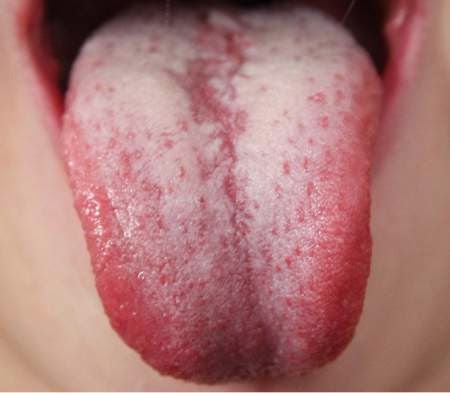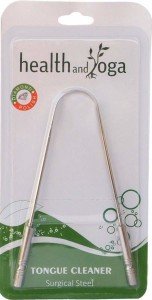Oral infections are very uncomfortable, as the humid and moist air and conditions inside the mouth make them hard to heal. Not to mention that the conditions that are given by both white coated tongue, and oral thrush, is making the simple act of eating a very unpleasant one.
But what is the difference between the white coated tongue and oral thrush? What are the symptoms and what causes these conditions? And, most importantly, what treatments are for curing the unwanted symptoms? All the possible questions will be answered in the following lines.
-
White coated tongue
 |
| White Coated Tongue |
The white color of the tongue is given by too many bacteria and fungi that grew and spread, covering the pink cells of the tongue. In some cases, it is not a severe condition, white coated tongue being handled by enhancing the personal hygiene of the mouth. It usually goes away if you start brushing with a scraper, gently and rinse it with a lot of water. But if you see changes that appear unusual on the tongue, it begins to be painful, or the white coat does not disappear after two weeks of intense cleaning, you should contact a doctor. It may be an indicator of other more severe issues.
Signs and symptoms of white coated tongue
Because the debris and bacteria gather up on the surface of the tongue, it will get a whitish color, like being covered with a soft blanket of moss. The tongue’s buds and cells will not get a proper breathing so that it will get inflamed and swollen. So a typical sighting for white coated tongue is a tongue that appears bigger, due to the inflammation.
You shouldn’t worry if you have a slight coating of the tongue. It indicates a good digestive system. Things get worse when the entire tongue is looking white, and you have problems with dry mouth, sore through, pains or discomfort. White coating on the tongue can be due to a Candida infection as well, referred to as oral thrush. But we will talk about this subject a bit later on. The main idea is that when the white coating gets in your way, giving you a hard time and maybe a bad breath, it is time to step in.
Causes of white coated tongue
The most evident reason when it comes to bacteria spread is a poor hygiene, which is for sure. If you smoke or consume alcohol rather often, things might add up, and you may wake up one morning with a white tongue. So the best things to do, when brushing your teeth, to gently clean your tongue as well. Even if it doesn’t present any signs of inadequate hygiene, washing it in a regular manner will prevent the bacteria from growing too much.
Also, the white coated tongue appears in case of a dried mouth. When, for certain reasons, you do not use your mouth for eating, drinking, or regularly speaking, the bacteria are not disturbed and can spread in pace.
Foods that are pureed, too soft or mushy can enhance the white coating of the tongue.
It is fine to have them, once in a while, but if you develop a habit out of eating soft foods, you should expect a growth of bacteria on your tongue.
White coated tongue treatment
Because it is a fungal infection, a proper hygiene should solve the problem. Use a tongue scraper to remove the excess grown bacteria from your tongue. If you are careful to brush your teeth at least twice a day, you should have the matter covered.
There are also special toothbrushes that had a special back for tongue scraping and washing.
Using a good mouthwash or hygiene lozenges can also help improve the situation. So you might want to try one of those, for the prevention.
Cleaning your tongue properly, every day, will only take about two minutes. And the result will be a fresh breath and a pink and handsome tongue. I suppose it’s worth the effort.
What Chinese medicine says about white coated tongue
Traditional Chinese medicine has its way of doing things. If you ever visit a traditional Chinese medicine doctor, the first thing he’d like to look at is your tongue. According to the way your tongue is looking, he might tell where your problem is.
So what does white coated tongue mean in Chinese medicine? Well, if the white coating is thin, it is a sign of a normal health, as nothing bad is occurring. But if the white layer is thick, it will indicate a problem with your stomach. And this is true. Bacteria multiply in the mouth also due to a poor digestive system, besides the poor hygiene.
-
Oral thrush
 |
| Oral Thrush |
The oral thrush is an infection caused by a fungus, called Candida or more commonly known as yeast. The thrush will not manifest only in the mouth, as it can be seen as a diaper rash in babies and vaginal infections in women. Oral thrush can affect anyone, adults, and children.
Read also: Signs and Symptoms of Chlamydia in Women
Oral thrush causes
The main cause of oral thrush is Candida fungus. It is found naturally in our mouth, intestines and even on our skin. You mostly never know it’s there because other microorganisms take care of controlling the Candida fungus population. So it will never cause any trouble unless something happens and ruins the natural balance between the fungus and microorganisms.
Usually, diseases and the treatments of diseases affect this natural balance. Medicines like antibiotics, birth control pills, and corticosteroids also destroy our helpful microorganisms, besides the virus that is causing the disease we are suffering from. So without the guardian that was keeping the Candida under control, the fungus spreads too much, causing oral thrushes or in other parts of the body.
But besides medicines, there are some medical reasons Candida might also occur. Some illnesses can also influence the appearance of Candida. Diabetes that is not adequately controlled, HIV, cancer, dryness of the mouth or hormonal unbalances due to pregnancy.
Oral thrush symptoms
Here comes the most uncomfortable part. Oral thrush has symptoms that are hard to ignore. So don’t worry of not knowing whether you have or not oral thrush. Believe me, you will know.
First of all, small and white inflammations, like little bits of cottage cheese appear on your tongue, maybe on the inside of your cheek and even on the roof of the mouth. But they can also spread down the throat and into your swallowing tube. The sensations these small inflammations produce are very uncomfortable. They will soar if you try to scrape them with the toothbrush or your teeth, and even bleed. So it is out of the question to attempt to clean them off the way it is indicated in the case of white coated tongue. Because they are painful, you will find swallowing your food rather difficult and unpleasant. If the infection spreads down to the esophagus, you will feel like a bit of your food got stuck somewhere in the middle. Fever may also occur, but only in the case the Candida spread beyond the esophagus.
Read Also: Top 11 Causes of Bleeding Gums
Oral thrush treatment
Anti-fungi treatments are the ones that will solve the matter regarding oral thrush. Depending on the symptoms and severity, the treatment for oral thrush may include mouth gels or drops to treat the affected areas inside the mouth. Usually, after applying the gel or taking the drops, you should not eat or drink for about 30 minutes. It is about the same things as in the case of drops for sore throats.
Tablets are also used, especially in the treatment of more severe oral thrush cases. Usually, the tablets for oral thrush contain an active substance Fluconazole, which helps remove the excess fungus out of your body and reduce the inflammation caused by it. When there is the need for you to take antibiotics for a particular disease, or other medicines that might influence the appearance of Candida, the doctor might prescribe some prevention pills of Fluconazole.
Oral thrush treatment over the counter
Of course, if the oral thrush is not too severe, and it is limited only to the area of the mouth, you can always get a treatment for it over the counter.
The most frequent treatments that are recommended in almost any pharmacy you enter are the topical treatments. Got you locked in?
Topical treatments mean that the treatment applies to the damaged area. So it mainly refers to gels, rinses, lozenges or drops. The ones with the best actions are the lozenges because they are the one that stay longer. And in the case of oral thrush, the medicine has to stay on as long as possible, in order to stop the action of the fungus.
Oral thrush in babies
Babies are the most prone to develop an oral thrush. Why?
First of all, because they still have a fragile immune system that doesn’t yet offer the best protection against any infection. Premature babies are even more exposed. Also, if the baby was on antibiotic treatment, for whatever reason, the same rule as in adults will apply. Antibiotics will affect the already too fragile helpful organism and will increase the risk of yeast infections.
A mother that is breastfeeding and has taken antibiotics can also pass a large number of fungi, due to her own unbalance, through the milk to the baby. Thus, in this case, the risks are higher.
Oral thrush home remedies
Probably you find it hard to believe that such a nasty illness, like oral thrush, can be treated at home. Here is what you can use as a home remedy for oral thrush:
- Virgin coconut oil, as it has an active element called Caprylic acid.
- Plain yogurt.
- White distilled vinegar.
- Diluted baking soda (about 1 tablespoon in 8 oz. of water).
- Methylene blue (a rather old, but efficient disinfectant).
All the above ingredients must be applied to the affected area directly. Try to let them act as much as you can.
Also, rinsing the mouth with salted water can help. Funguses do not like salt water so that it may suffocate and die, which is the best option for you. Take half of spoon of salt and dissolve in a cup of warm water (about 240 ml). Rinse with this water the best you can and then spit it out. Do not swallow it.
After your oral thrush problem disappears, make sure to get rid of your old toothbrush. You don’t want to get the thrush back again.
Even though the white coated tongue and oral thrush are both affections that occur in the oral cavity, these two cannot be mistaken.
A white coated tongue is a mere hygiene problem and can be solved by following simple cleaning procedures. It won’t hurt either. While oral thrush is rather a burden, as you will feel immediate as the disorder gets installed in your mouth. The white formations will hurt if you try cleaning them out and you might even find it difficult to eat, which is not the case for white coated tongue. Oral thrush needs serious treatment, because it is a fungal infection that will not leave that easily.


